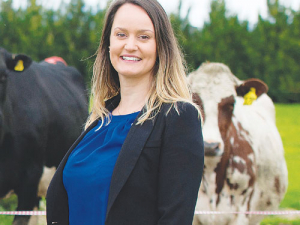New Zealand dairy farmers can look forward to a good season in 2017-18, after having enjoyed the fruits of improved commodity prices much earlier than their global counterparts.
This is the message from agribusiness banking specialist Rabobank.
But further upside to the current farmgate milk price may be limited, the report says.
In the recently released report New Zealand Dairy Sector – Out of the Woods, Rabobank says global dairy prices are now better balanced than at the start of this season. This balance is likely to flow through to largely stable commodity pricing through the 2017-18 season, says Rabobank dairy analyst Emma Higgins.
Her report says despite rising farmgate milk prices, the cashflow benefit has only just begun to be realised. Depending on milk processors’ payment systems, the benefits of improved global market dynamics did not materialise in advanced rates until the beginning of 2017.
Rabobank anticipates limited upside to $6/kgMS for the 2016-17 season. However this milk price will ensure a cash surplus for most NZ farmers.
Based on its current assessment of global fundamentals, Rabobank expects commodity prices to remain steady through 2017-18.
Global milk production will begin to recover but export surpluses are unlikely to increase until the latter half of 2017.
Rabobank expects Chinese dairy imports to increase by 20% year on year, underpinning the whole milk powder (WMP) markets.
Downside risks to the bank’s outlook however, include increased supply out of Europe and political uncertainties influencing economics. With good weather and cash-positive farmgate milk prices, there is a chance that European milk production growth could bounce higher than anticipated.
Furthermore changes in the political environment in Europe and US could create adverse exchange rate movements for NZ exporters and add to market uncertainty.
However, Higgins says greater market balance is likely to ensure a favourable farmgate milk price for next season.
“Milk output around the globe continues to remain low. While the speed of decline in milk production is slowing, it will take until the latter half of 2017 for volumes available for export to increase. On the demand side, we expect a significant uptick in Chinese dairy import volumes in 2017 and this will help to underpin WMP markets,” she says.
“These dynamics are set to keep global supply and demand largely in balance and, assuming a spot currency rate, we forecast the global market is in line to deliver a farmgate milk price near $6.25/kgMS.”
The report says a milk price in this ‘ballpark’ would finally allow NZ dairy farmers to “emerge from the woods” after two years of depressed commodity pricing.
“Despite recent increases in farmgate milk prices, the cashflow benefit has only just been realised in farmers’ pockets due to lower early-season advance payment rates, and another profitable season in 2017-18 is crucial to boost confidence in the sector,” Higgins says.
“Depending on cost structures, a milk price of $6.25kg/MS would be profitable for [most] NZ farmers and would provide a second year of healthy farmer margins.”
The report says a further factor which will support farmgate margins in the 2017-18 season is the affordability of farm inputs, with fertiliser and feed expenses looking set to remain comparatively low.
While a positive season is looking likely, Higgins urges farmers to proceed cautiously.
“Farmers need to be conscious of the risk that the equation may play out less positively. Keeping cost control front of mind for the 2017-18 season will help to maintain positive margins at improved milk prices and to maximise business resilience.”
Given the timing of the short-term cycle, NZ farmers should be budgeting for slightly higher retail fertiliser prices versus last year.
Higgins says there are several risk factors to consider: increased milk supply out of Europe and currency shifts.


















